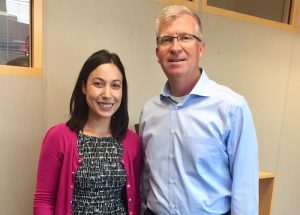
In July, Governor Rick Snyder appointed Jeff Mason as CEO of the Michigan Economic Development Corporation. Michigan Venture Capital Association had the opportunity to sit down and talk with Mason about how his experience with the University Research Corridor will help him in his new role, his plans for attracting and supporting entrepreneurship in the State, and his vision to create a stable, more diverse economy by building on the strength of Michigan’s research and development to advance sectors such as mobility, cybersecurity and more.
Share on Twitter: #MichiganVCA exclusive Q&A with @JeffMason3 @MEDC talks attracting #talent to #Michigan https://ctt.ec/LafPN+
How did you feel when you heard you might be appointed to the role by Governor Snyder?
I was really flattered to come back to the Michigan Economic Development Corporation (MEDC). It’s been eight years since I left the organization. Not only is this a wonderful organization, but also the mission [providing the tools and environment to drive job creation and investment] is so important to the state.
What’s one thing you’re bringing from your previous role as executive director of University Research Corridor that you think will help you in your new position?
The one thing I would call out is the notion of collaboration and partnership. I think a lot of people were surprised the University Research Corridor (URC) – three universities [Michigan State University, University of Michigan, and Wayne State University] – could work together, and we spent a lot of time working and building these relationships within the institutions to move them forward with the idea the whole is better than the sum of its parts. MEDC is a big organization, and building on my experience [at URC], we need to work with local partners throughout the state to drive the economy forward.
What role do you think universities play in building a strong entrepreneurial and investment community in Michigan?
I think universities play an important role in building a strong entrepreneurial and investment community. From my experience at URC — three universities producing $3 billion on an annual basis — what you’ve seen historically is [that] they not only play an important role in producing talent but also talent that will build their own companies. [Also, universities are] building their entrepreneurship curriculum. Wolverine Ventures is an example of a company that creates an entrepreneurship environment for students to explore those kinds of opportunities.
How is MEDC working to attract talent and entrepreneurs to Michigan?
We are working to foster an entrepreneurial ecosystem. This steady investment and support for the entrepreneurial community across the state has created these “sticky” points, where talent can find a path to success — as opposed to either having to leave the state to be successful or to the extent that we can import that talent or bring that talent back home.
What do you think is the current state of Michigan’s economy?
Pretty bullish. With unemployment at 3.8 percent, I’m optimistic about not only where we are but what lies ahead. We have such strong economic roots. From a historical perspective, the automotive industry has allowed us to achieve so much. Now, we need to further build the auto industry and the R&D strength. Three-quarters of all automotive R&D occurs in Michigan. Our companies and universities give us the platform to go to the next level, whether in areas such as mobility, cybersecurity, defense, and aerospace. There’s an endless array of possibilities for our economy.
What can Michigan do to improve its economy?
I don’t think we are alone in this — we need to address the talent issue, [build] the talent pipeline, and grow talent from within the state, whether it’s a skilled trades, associate degrees, four-year degrees. We also have to attract more talent to Michigan, whether that’s through immigration or making our communities vibrant and exciting places for people to live and work. Those are some of the things we’ve been working on at MEDC. One of the interesting differences that I’ve seen since coming back is how engaged the organization is in working with communities across the state to help them be ready and prepared to redevelop and truly transform their communities as attractive places to live and work.
How do you think the “Good Jobs for Michigan” initiative will impact Michigan’s economy?
That initiative helps to fill a gap that we had in our toolbox; it allows us to compete for some of these large opportunities both on a national and global basis. The governor and legislature, in the past few years, have created the right environment for job growth. Whether through tax policy or other policies. The Good Jobs package is an indication that the marketplace is very competitive. A lot of states have great business climates, but a lot of states also are providing incentives to attract these large projects. It’s a measured approach to respond to what’s going on in the marketplace.
The “Good Jobs for Michigan” initiative is geared towards attracting large national or global employers. Do you foresee MEDC assisting or developing initiatives focused on helping early-stage companies like the ones MVCA works with?
One of the things I want to do before I get prescriptive is to spend time out in the community, whether it’s the venture community or local economic development partners, to understand where there are gaps and figure out how together we can identify new opportunities.
To the smaller, earlier stage or startup environment, I would point to the continuous efforts that MEDC has made to support that part of the economy. We must be in the business of attracting companies and growing and supporting our existing ones. There are ways we can interweave some of this and do some more of that and make everyone successful.
 Is there anything else you’d like to touch upon?
Is there anything else you’d like to touch upon?
MVCA has been a great organization to bring that community together and has been a great partner. MEDC looks forward to working with the organization going forward.